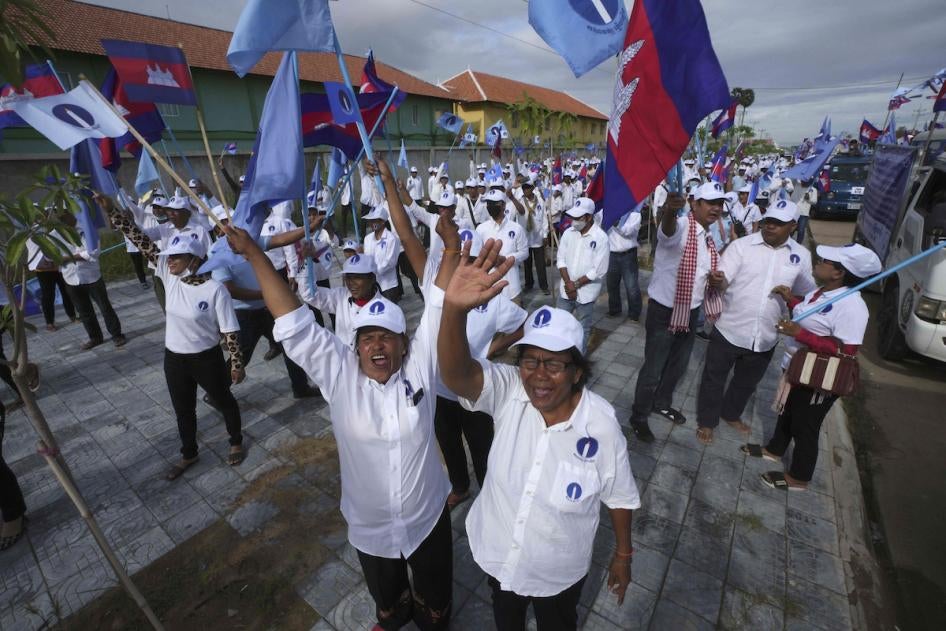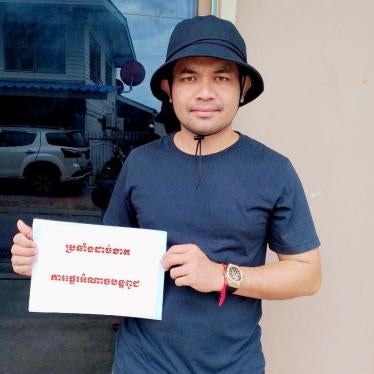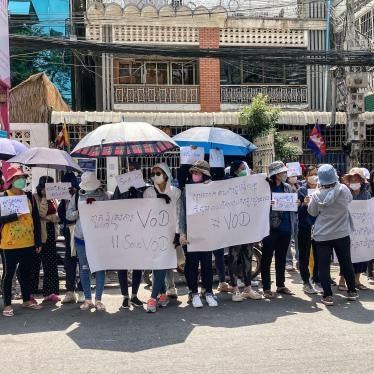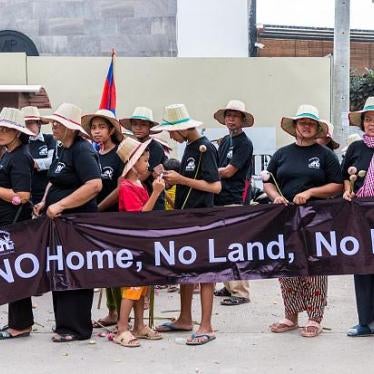Excellencies,
We, the undersigned civil society organisations, are writing to alert your government to
the worsening human rights crisis in Cambodia, and to appeal to you for your support for a resolution strengthening and extending scrutiny of the situation to be adopted at the 54th regular session of the UN Human Rights Council (the “Council”).
Human rights violations perpetrated in the context of general elections held on 23 July mark a new low in the two years of continual decline in the overall situation of human rights in Cambodia since the last Council resolution on the country in October 2021.[1] There has been no tangible progress, and the Cambodian government has failed to demonstrate any political will towards meeting the 20 benchmarks presented to the Council in October 2022 by the Special Rapporteur on the situation of human rights in Cambodia “to help promote human rights implementation in the country.”[2]
The High Commissioner for Human Rights Volker Türk described the environment leading up to the July general elections as “a severely restricted space that negatively impacted on the rights of Cambodians to participate fully and equally in all aspects of the electoral process.”[3] Similarly, a joint statement by at least seven UN human rights experts said that “[t]he lead up to recent elections […] and its results are extremely disconcerting.”[4] They further said that “[a] range of serious human rights violations and severe restrictions on civic and political space […] including a ban on the main opposition party, media restrictions and blockages and the harassment of perceived opponents of the ruling elite….”[5]
The government engaged in serious attacks on political opposition in the lead-up to the elections, with violent rhetoric, and arbitrary arrests and detention of political activists. The non-independent, politically biased National Election Committee[6] disqualified two opposition parties, including the Candlelight Party,[7] which was widely considered to be the most credible opposition party. Days before the election, the government ordered internet service providers to block access to the websites and social media accounts of at least three news outlets perceived to be critical of the government.[8]
The government has continued a policy of systematic and relentless persecution of human rights defenders, environmental and land rights defenders, trade unionists, political opposition, and independent media and media workers through judicial harassment including mass trials and legal action, as detailed in the annex to this letter.
The conviction and sentencing to 2-years’ imprisonment of trade unionist and labour rights activist Chhim Sithar along with eight labour activists in May 2023, the conviction of 10 land rights defenders in Koh Kong in August 2023, and the conviction and 27-year prison sentence against opposition leader Kem Sokha in March 2023 are emblematic of the continuing pattern of criminalisation and judicial harassment of human rights defenders and political opposition. A judiciary that lacks independence from the executive branch renders the prospect of fair trials and due process guarantees virtually non-existent for those perceived to be critical of, or a threat to, the interests of the ruling elites.
The Cambodian authorities have demonstrated a systematic and growing intolerance of independent media. The latest example is the arbitrary revocation of the media license of the Voice of Democracy, run by the Cambodian Center for Independent Media, which, as a group of UN human rights experts concluded, “leaves virtually no free media outlets operating in the country.”[9]
Laws are routinely misused to restrict human rights, undermine and attack civil society, and criminalise individuals for their exercise of freedom of expression, peaceful assembly and association. Provisions of the Criminal Code, especially article 305 on defamation, article 453 on ‘plotting’ against the government, and articles 494 and 495 on incitement to commit felony and disturb social security have been routinely used against human rights defenders and political opponents. The Law on Non-Governmental Organisations, Law on Trade Unions, and Law on Political Parties continue to pose serious challenges for civic and political freedoms in Cambodia, while draft laws being contemplated by the government on cybercrime and on public order would provide further tools of repression.
Over the past years, the Special Rapporteur on Cambodia has played a vital role in adding an independent and respected voice to verify and bring attention to the reporting of human rights groups and activists on the ground. The government’s restriction of civic of space and crackdown on the exercise of freedom of expression, and reporting by independent and critical voices makes the role of the Special Rapporteur even more vital in the promotion of respect for human rights and ensuring protection of fundamental freedoms and vulnerable populations in the country.
It is imperative that the Council seizes the moment and takes effective action at its 54th session to address the government’s continuing systematic repression, restriction of civic and political space and clampdown on human rights in Cambodia. The Council should send a clear message to newly appointed Prime Minister Hun Manet and the government that there is a cost for continuing the ruling Cambodian People’s Party’s (CPP’s) past systematic approaches to silencing the media and targeting dissenting voices. The message sent now should be clear – that the international community will hold the government accountable for their human rights commitments and obligations. To this end, the Human Rights Council should ensure adequate monitoring and reporting, and track progress (or lack thereof) against the concrete benchmarks that have been elaborated by the Special Rapporteur.
In this regard, our organisations urge the Council to adopt a resolution that:
- Renews the mandate of the Special Rapporteur on the situation of human rights in Cambodia for a further two years to ensure continued monitoring and reporting on the situation in the country as well as to provide technical assistance and capacity building, with a view to fully implementing Cambodia’s international human rights obligations;
- Welcomes, and mandates enhanced monitoring and reporting on the progress in the implementation of, the 20 benchmarks presented by the Special Rapporteur on the situation of human rights in Cambodia to the 51st session of the Council;[10]
- Substantively and accurately reflects the situation on the ground as documented in the report of the Special Rapporteur that will be presented to the 54th session of the Council, as well as concerns expressed by the High Commissioner and other Special Procedures in relation to, among others, the persecution of human rights defenders and political opposition including Kem Sokha, and restrictions on the rights to freedoms of expression, peaceful assembly and of association.
We further urge your government, during the 54th session of the Council, to speak out strongly and unequivocally against the continuing pattern of violations of human rights in Cambodia, to send a clear message that impunity for human rights violations will not be tolerated.
We remain at your disposal for any further information.
Sincerely,
Amnesty International
ARTICLE 19
Asian Forum for Human Rights and Development (FORUM-ASIA)
CIVICUS: World Alliance for Citizen Participation
Human Rights Watch
International Commission of Jurists (ICJ)
International Federation for Human Rights (FIDH)
World Organisation against Torture (OMCT)
ANNEX: Key developments since the adoption of the Council’s last resolution on Cambodia (HRC resolution 48/23) in October 2021:
Trade Unionists, Peaceful Protestors and Human Rights Defenders
In May 2023, the Phnom Penh Municipal Court convicted union leader Chhim Sithar, alongside eight members of the Labour Rights Supported Union of Khmer Employees of NagaWorld (LRSU), of “incitement to commit a felony or disturb social security” under articles 494 and 495 of the Criminal Code. Sithar was sentenced to two years in prison while others were sentenced to one to one and half years in prison and received suspended sentences or judicial supervision. Their convictions stem from peaceful strike action in December 2021 and January 2022 demanding higher wages and the reinstatement of hundreds of union members who were laid off by NagaWorld Casino.
On 15 August 2023, the Koh Kong Provincial Court convicted 10 land rights activists of malicious denunciations and incitement to disturb social security and were sentenced to one year imprisonment and ordered to collectively pay 40 million riel (approximately USD 9,600) in compensation.[11] These convictions follow convictions of three other Koh Kong land activists of criminal charges including defamation, incitement and malicious denunciations in relation to their peaceful defence of their communities’ land rights.[12]
In November 2022, the Supreme Court upheld a five-year prison term for five current and former workers of the Cambodian Human Rights and Development Association (ADHOC), on bribery charges that human rights groups believe to be politically motivated.
Crackdown on and harassment of political opposition
Cambodian authorities have pursued politically motivated prosecutions against more than 150 opposition party leaders and members, some of whom have fled the country fearing reprisals. There are at least 50 political prisoners behind bars in Cambodia.[13]
In March 2023, opposition leader Kem Sokha was convicted on charges of treason or conspiracy with a foreign power and was sentenced to 27 years in prison.[14] UN human rights experts, in a joint statement, said that Sokha’s conviction was “politically motivated” and was “evidence of an ongoing pattern of the misapplication of laws to target political opponents and any critic of the Government.”[15] They further said the entire judicial process against Sokha “has been fraught with irregularities and failed to meet the standard of either Cambodian or international human rights law.”
Following Sokha’s conviction, the Supreme Court in March 2023 in a mass trial upheld the March 2022 conviction of 12 members of the arbitrarily dissolved Cambodia National Rescue Party (CNRP) and a former government official on charges of ‘incitement’ and ‘plotting,’ and sentenced each to 5 years in prison with 16 months suspended sentences.
In another mass trial in December 2022, the Phnom Penh Municipal Court convicted 36 former leaders, members and supporters of the CNRP of plotting under article 453 of the Criminal Code for allegedly assisting attempts by exiled members of the opposition movement to return to the country. This was the fourth verdict in five mass trials that have been initiated against a total of 158 leaders and supporters of the former CNRP since November 2020.[16]
In May 2023, months before the national elections, the National Election Committee disqualified the main opposition, the Candlelight Party – which was widely considered to be the only credible opposition to the ruling Cambodia People’s Party – from contesting in the elections in July 2023. The party was alleged to have failed to fulfil documentation including missing original paperwork proving its registration with the Ministry of Interior.
The Candlelight Party’s disqualification was a major step in the deepening harassment and intimidation against the party and its leadership by authorities. In July 2022, Soy Chhay, a Vice President of the party, was charged with defamation under article 305 of the Criminal Code for criticising the conduct of the commune elections and the National Elections Committee. In January 2023, Thach Setha, a Vice President of the Candlelight Party, was arrested for allegedly issuing worthless cheques in a case his party said was politically motivated.
Following the ban on the Candlelight Party, and in the lead up to the elections, Cambodian authorities intensified the attacks and harassment, including with trumped criminal charges and detention, of party members.[17] This escalation of attacks followed the threat of physical violence against the opposition by the then Prime Minister Hun Sen in a video posted on his own Facebook page which resulted in the removal of the video by Meta.[18]
Days before the election, 4 activists of the Candlelight Party were arrested and 17 other opposition activists and politicians who were fined and barred from holding political office for 20 years for allegedly spoiling ballots, encouraging people to destroy ballots, and ‘disturbing the peace’.[19]
Freedom of expression, media freedoms and freedom of association
The Cambodian government has demonstrated a growing intolerance for human rights including freedom of expression, with a continuing pattern of systematic repression and criminalisation of critical voices and independent media.
This is most clearly illustrated by the cancellation of the broadcast licence of Voice of Democracy (VoD) in February 2023. A group of UN human rights experts expressed alarm at “the revocation of VoD’s license without due process” further adding that “the revocation leaves virtually no free media outlets operating in the country.”[20]
In January 2023, the authorities ordered the removal of a music video by a popular rap music artist that recounts a deadly government crackdown on a workers’ protest nine years ago.[21] The government reportedly ordered the police to prevent the dissemination of the video alleging that its “inciting contents that can contribute to instability and social disorder.”
The cybercrime police questioned the operations director of prominent human rights NGO, LICADHO, over the group’s alleged involvement in releasing the video, as well as other NGO leaders. LICADHO removed the video from its Facebook to avoid further legal action. The authorities have not confirmed that this investigation has closed and charges could still arise from this incident.
Further, the restrictive 2015 Law on Associations and Non-Governmental Organizations (LANGO) continues to be used to restrict civil society groups. Its onerous registration requirements, reporting obligations and broad grounds for denial of registration provide opportunities for government actors to put pressure on CSOs for politically motivated reasons.
Cambodia is currently rated “Repressed” by CIVICUS Monitor[22] and was recently added to its Watchlist for rapid decline in civic freedoms.
[1] A/HRC/RES/48/23 (adopted on 11 October 2021).
[2] A/HRC/51/66 (18 August 2022).
[3] https://www.ohchr.org/en/press-releases/2023/07/cambodia-un-human-rights-chief-regrets-elections-held-restrictive.
[4] https://www.ohchr.org/en/press-releases/2023/08/cambodias-shrinking-democratic-space-affected-credibility-national-elections.
[5] Ibid.
[8] https://www.ohchr.org/en/press-releases/2023/07/cambodia-un-human-rights-chief-regrets-elections-held-restrictive
[9] https://www.ohchr.org/en/press-releases/2023/02/cambodia-un-experts-call-reinstatement-voice-democracy-say-free-media.
[10] A/HRC/51/66
[15] https://www.ohchr.org/en/press-releases/2023/03/cambodia-un-experts-condemn-verdict-against-opposition-leader-kem-sokha








